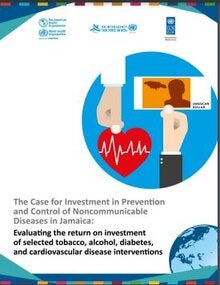Overview
Noncommunicable diseases (NCDs) are a major driver of morbidity and mortality in Jamaica. Beyond the toll on health, NCDs also impose a significant burden on the national economy since individuals with NCDs are more likely to exit the labor force, miss days of work, and/or work at reduced capacity. In addition, high expenditures to treat NCDs impose a direct economic burden to the health system, the society and to the nation of Jamaica, which can lead to reduced investments in areas like education and physical capital, which increase gross domestic product (GDP) in the long run. Unless urgently and adequately addressed, the health and economic burden of NCDs will continue to rise. To help strengthen Member States’ capacity to generate and use economic evidence on NCDs, the Pan American Health Organization (PAHO) partnered with the Ministry of Health of Jamaica, the World Health Organization (WHO), the United Nations Development Programme (UNDP), and RTI International to develop an Investment Case for NCDs in Jamaica […] It should be noted that the focused nature of the case underestimates the true costs associated with NCDs in Jamaica: only 17 out of the 88 interventions cited in the updated Appendix 3 of the WHO Global NCD Action Plan 2013-2020 are modeled; cancer and chronic respiratory disease interventions are not considered; not all the health benefits of the interventions (for example, the impact of tobacco control policies on lung cancer or chronic respiratory diseases) are accounted for; and for alcohol policies, only the economic impact of adverted mortality is included (the benefits of reducing absenteeism and presenteeism are not) due to methodological limitations.
|

